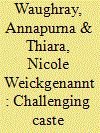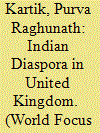|
|
|
Sort Order |
|
|
|
Items / Page
|
|
|
|
|
|
|
| Srl | Item |
| 1 |
ID:
121106


|
|
|
|
|
| Publication |
2013.
|
| Summary/Abstract |
This essay, the collaborative product of a legal scholar and a literary critic, examines the relationship between Dalit literature and legal assertion in challenging caste discrimination in Britain. The construction of caste discrimination in India as an international human-rights issue from the late 1990s onwards has raised awareness of caste discrimination in Britain and given impetus to long-standing demands for caste discrimination in Britain to be made illegal - a possibility envisaged in the Equality Act 2010. We were interested in finding out whether the intense lobbying for a change in British law by Dalit organisations was matched by a similarly vibrant cultural output by Dalit writers and artists, as exists in India. The article specifically analyses the play The Fifth Cup by Rena Dipti Annobil and Reena Bhatoa Jaisiah and the poetry of Daljit Khankhana as examples of British Dalit writing. These Dalit writers are involved in legal and political campaigning against caste discrimination and their writings engage with the concept of law, but only the play by Annobil and Jaisiah addresses caste discrimination in the UK whereas Khankhana's poetry focuses on violence against Dalits in India. The writings reflect two different political strategies towards caste identity and the struggle against casteism. With regard to caste identity, Khankhana disavows it or represents it as problematic in his poetry, asserting a totally non-caste identity, whereas Jaisiah and Annobil embrace and celebrate Dalit identity in their play as having the potential for resisting casteism. However, despite their different approaches to caste identity and the struggle against casteism, both Khankhana and the playwrights Jaisiah and Annobil support the legal prohibition of caste discrimination in Britain.
|
|
|
|
|
|
|
|
|
|
|
|
|
|
|
|
| 2 |
ID:
128176


|
|
|
|
|
| Publication |
2014.
|
| Summary/Abstract |
After 1950s a large number of Indians migrated to United Kingdom (UK) with cultural, traditions and religious values and practices, which included practice of caste discrimination too. As Dr. BR Ambedkar anticipated, the Indian migrants will carry the caste system to other regions of earth and it would become a problem of the world. This prediction came true as cast discrimination has indeed migrated with the Indian Diaspora to east and south Africa, Mauritius, Fiji, Surinam, the middle east (for example in Bahrain, Kuwait, the United Arab Emirates), Malaysia, the Caribbean, the United Kingdom, North America, and other regions (Natural 2001). With the other Indian Diaspora dalits (untouchables) of India also migrated to the UK. It has been estimated that around 250000 dalits are living in the UK (CERD 79, UK Report.).
|
|
|
|
|
|
|
|
|
|
|
|
|
|
|
|
|
|
|
|
|